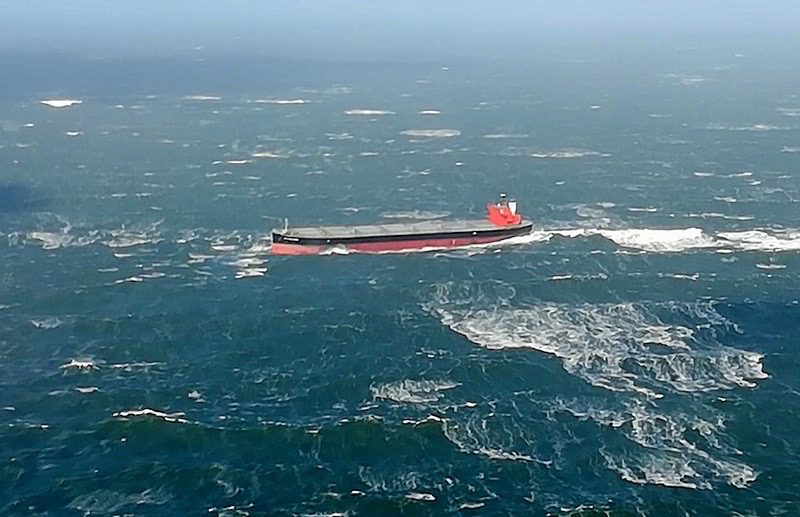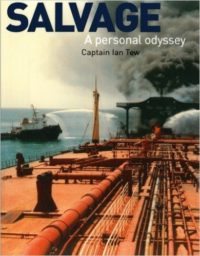India’s Oil Demand Drives CMB Tech Fleet Diversification
By Dimitri Rhodes Nov 7 (Reuters) – Belgian oil tanker company CMB Tech says it will focus on the fast growing market in India as it reported third quarter results...


The photo provided by Germany’s Central command for maritime emergencies shows the Panama-flagged bulk carrier Glory Amsterdam which ran aground off the shore of the German island of Langeoog on Sunday, Oct. 29, 2017. Germany was hit by a heavy storm on Sunday.
![]()
![]()
BERLIN, Oct 30 (Reuters) – Shallow waters off a North Sea island complicated efforts on Monday to dislodge a large freighter that ran aground as Germany began cleaning up after a storm that killed at least six people there and in Poland and Czech Republic.
Railway operator Deutsche Bahn continued to deal with “significant damage” from downed trees on some rail routes. Service will be limited in parts of northern Germany, DB said, after being suspended in large parts of the north and centre of the country on Sunday, stranding thousands of travellers.
In the North Sea, authorities were monitoring the “Glory Amsterdam,” a 225-metre (742-foot) freighter that foundered 2.2 km (1.36 miles) from the German island of Langeoog, for any signs of oil leaks, said Michael Friedrich, spokesman for Germany’s Central Command for Maritime Emergencies.
Incident Photos: Bulk Carrier GLORY AMSTERDAM Aground Off Germany
But plans to tow the freighter free during high tide on Monday were being revised after officials determined the waters were too shallow for the ship that would have done the towing, Friedrich said. Instead, workers would seek to lighten the ship’s load and use ships with shallower draft for towing.
“We’re working on a plan, but the towing will definitely not happen today,” he said. The freighter’s captain had reported all was well on board and the ship’s crew of 22 was safe.
The freighter was not carrying any cargo, Friedrich said. Concern about an oil leak centred on 1,800 tonnes of heavy oil and 140 tonnes of marine diesel the ship had on board for fuel.
The non-profit environmental group World Wildlife Fund said the oil on board continued to pose a significant risk to the Wadden Sea, a UNESCO World Heritage site, and renewed its call for a worldwide ban on heavy oil for use as ship fuel.
The Wadden Sea is the largest unbroken system of intertidal sand and mud flats in the world. Including sand banks, salt marshes and dunes, it stretches from the Netherlands to neighbouring Germany and Denmark.


“Numerous wading birds, ducks and geese that are resting there at the moment would be endangered by the oil” if the ship broke up, Hans-Ulrich Rosenberg, a mud flat expert with WWE, said in a statement.
A group representing German cutter and coastal fishermen questioned whether authorities had done enough to protect coastal areas. “This wasn’t exactly the storm of the century, which raises the question of whether the protections in place are sufficient,” said Dirk Sander, head of the group.
Elsewhere in Germany, Deutsche Bahn said rail traffic on a number of key routes – including the heavily travelled line from Hamburg to Berlin – would resume on Monday afternoon.
Thousands of travellers were stranded on Sunday, with some seeking shelter in special sleeping cars provided at stations. Trains that resumed service on Monday were crammed so full that some passengers had to disembark. (Reporting by Andrea Shalal; editing by Mark Heinrich)
© 2017 Thomson Reuters. All rights reserved.
Join the gCaptain Club for curated content, insider opinions, and vibrant community discussions.


Join the 110,095 members that receive our newsletter.
Have a news tip? Let us know.
Access exclusive insights, engage in vibrant discussions, and gain perspectives from our CEO.
Sign Up




Maritime and offshore news trusted by our 110,095 members delivered daily straight to your inbox.



Essential news coupled with the finest maritime content sourced from across the globe.
Sign Up